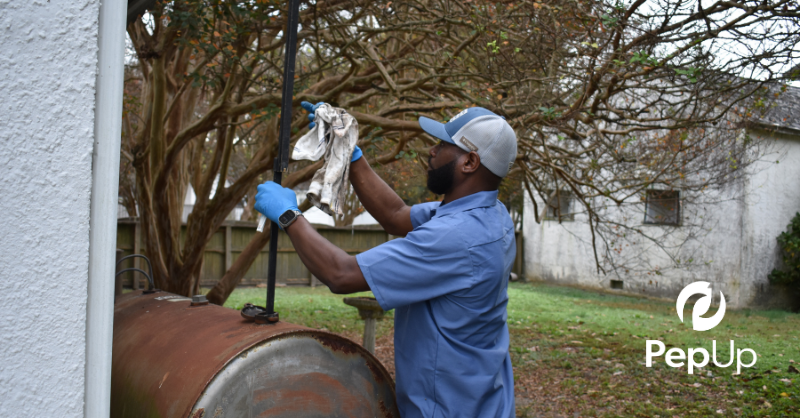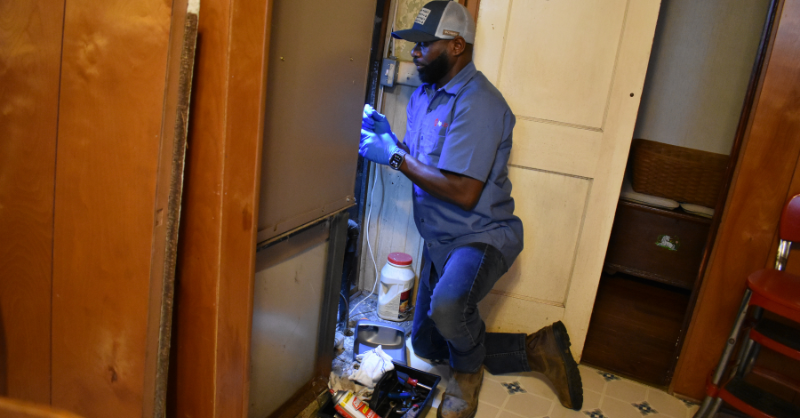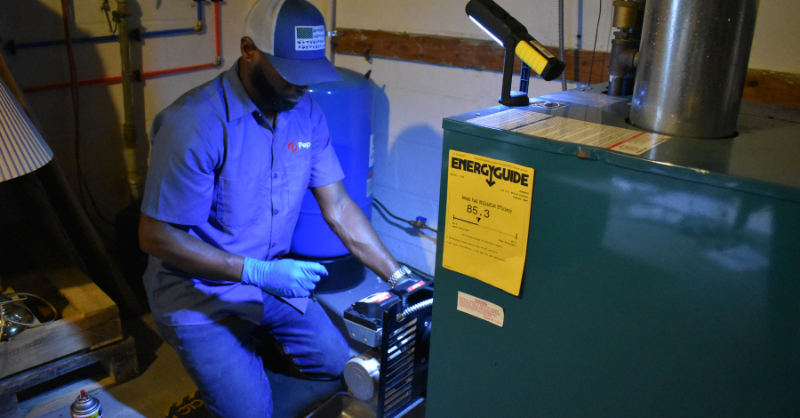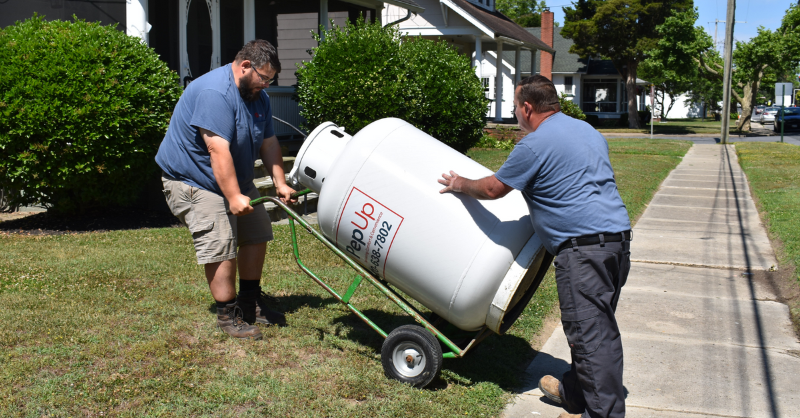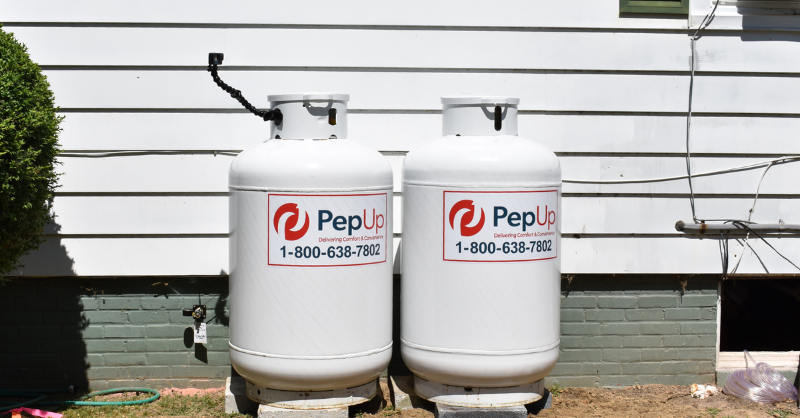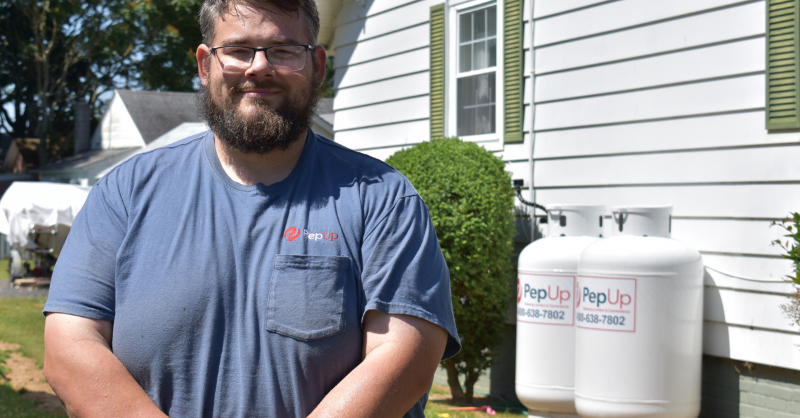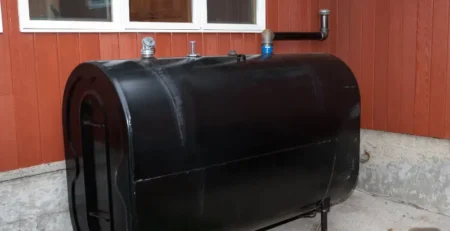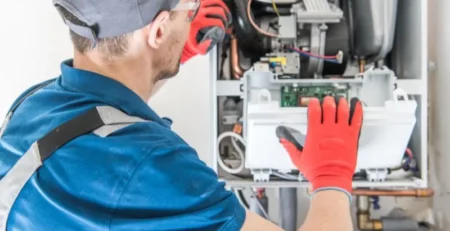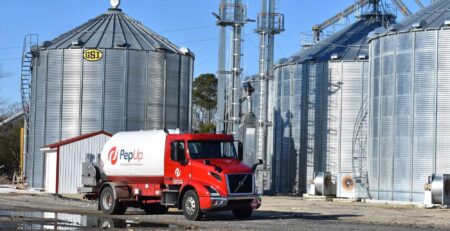The Ultimate Guide to Residential Heating Oil
If you’ve just purchased a home with an oil furnace or need a refresher on how to manage and use your heating oil system efficiently, PepUp wants to help.
Use this guide to find the answers you need about efficient heating practices, system maintenance, and even the pros and cons of converting your home’s heating system from oil to propane.
Heating Oil System Basics
What is heating oil?
Heating oil has been a staple for home heating since the early 20th century, especially in areas like Delmarva. Derived from crude oil, it is refined to create a safe and reliable heat source. Known for its ability to generate consistent, comfortable warmth during harsh winters, heating oil has powered countless homes across cold climates for decades.
What types of heating oil systems are common on Delmarva?
Our technicians most often encounter heating oil systems that include forced air, hot water baseboards, and steam radiators. Forced air systems use a furnace to heat air, which is distributed through ducts. Hot water systems (baseboards or radiators) use a boiler to heat water, which circulates through pipes. Steam systems are similar, but they use steam instead of hot water.
Here’s a quick overview of how a forced air heating oil furnace works:
- Thermostat activation. The process begins when the thermostat detects that the room temperature has fallen below the set level and signals the furnace to kick on.
- Oil pump activation. The furnace’s oil pump draws heating oil from the storage tank through a filter to remove impurities.
- Atomization. The oil is pumped under pressure and then atomized—turned into a fine mist—by a nozzle inside the burner.
- Combustion. The atomized oil mist is mixed with air and ignited by an electric spark or hot surface ignitor inside the combustion chamber, creating a controlled flame.
- Heat exchange. The heat produced by the burning oil warms up the heat exchanger, which then heats the air blown by the furnace’s blower fan.
- Warm air circulation. The blower pushes the heated air through the ductwork and distributes it throughout the home via vents, raising the indoor temperature.
- Exhaust venting. Combustion gases are vented out of the home through a flue or chimney, ensuring indoor air remains safe and clean.
- Thermostat monitoring. Once the desired temperature is reached, the thermostat signals the furnace to shut off, repeating the cycle as needed to maintain comfort.
What are the advantages of an oil heating system?
Using heating oil is a reliable way to maintain a cozy home, even when it’s wet and cold outside. Home heating oil is both clean and efficient, making it a reliable choice when your primary heating system is an oil furnace. Here are some key advantages of using heating oil:
- It’s clean. Modern heating oils are approximately 95% cleaner than those used half a century ago. This means you can enjoy efficient home heating while benefiting from a more environmentally friendly option.
- It’s dependable. Heating oil offers reliable warmth throughout your home, ensuring each room remains at your preferred temperature, even during harsh winter weather.
- It’s efficient. With its high energy output, your heating system will only require a minimal amount of heating oil. This efficiency, coupled with our extensive storage and distribution capabilities, allows us to offer competitive heating oil prices in Maryland, Virginia, and Delaware.
- It’s safe. Heating oil only ignites in the presence of an advanced burner system, ensuring safety from accidental ignition and giving you peace of mind about your system.
- It’s warm. One of the major benefits of heating with oil is its ability to generate warmth efficiently. It burns at a rapid 2,200 degrees Fahrenheit, which is much more effective than electric heat pumps. With an energy release of 138,500 BTUs per gallon, it provides exceptional warmth.
How is heating oil stored?
Homes in our area typically can have either aboveground or underground tanks to store heating oil. Aboveground tanks are easier to inspect and maintain and are generally located in a basement or outside the house. Underground tanks offer more space-saving solutions; however, they can be more challenging to inspect and carry environmental risks if leaks occur.
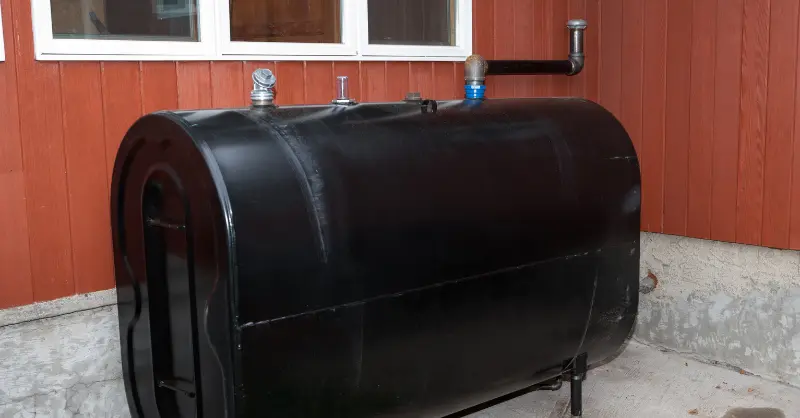
Tips for Operating a Heating Oil System
How do I check my heating oil levels?
It’s important to regularly monitor your home’s heating oil levels to ensure uninterrupted service. Most tanks come equipped with a gauge that visually indicates oil levels. Alternatively, a simple dipstick method can be used.
Learn more about how to check your heating oil levels using the dipstick method. Better yet, sign up for Automatic Delivery from PepUp, and we’ll install a wireless tank monitor that keeps track of your oil levels so you don’t have to.
What are the best practices for maintenance?
To maintain peak efficiency and reliability of your heating oil furnace and supply lines:
Conduct monthly checks: Ensure the tank is in good condition and that there is no noticeable wear or leakage.
Schedule annual inspection and service: Before the cold hits, have a professional inspect your system for any issues. This keeps any surprises at bay when you need heat the most.
During an inspection, a heating oil service technician will typically perform the following tasks:
- Visual Inspection: The technician will visually examine the entire system, including the furnace, tanks, fuel lines, and any accessible components. They will check for signs of wear, corrosion, or leaks.
- Cleaning the Furnace: Over time, soot and carbon deposits can build up inside the furnace, affecting its efficiency. The technician will clean these deposits from the burner and other components to ensure optimal operation.
- Checking the Burner: The burner is the heart of your heating system. The technician will inspect and test it to ensure it ignites properly and burns fuel efficiently. They might also calibrate the burner to optimize fuel efficiency.
- Inspecting the Fuel Nozzles and Filters: Over time, fuel nozzles can become clogged, and filters can get dirty. These components will be inspected, cleaned, or replaced as necessary to ensure smooth fuel flow.
- Checking Thermostat Controls: The technician will test thermostat controls and settings to ensure that your heating system responds properly and maintains the desired indoor temperature.
- Testing Safety Controls: Safety controls, such as the furnace’s limits, are tested to ensure they are functioning correctly and will shut down the system in case of overheating or other issues.
- Inspecting the Oil Tank and Lines: For both aboveground and underground tanks, the technician will check for signs of leaks or damage. Fuel lines are also examined for leaks or corrosion.
- Combustion Efficiency Test: This test analyzes the exhaust gases to determine how efficiently fuel is being burned. The results provide a clear indication of the system’s performance, and adjustments are made if necessary.
- Checking Air Flow: In systems with ductwork, the technician may check for blockages or leaks that could affect air distribution and overall system efficiency.
- Lubricating Moving Parts: Any moving parts, such as blower motors or pumps, are lubricated to reduce friction and wear.
Keep the area clear: Make sure the space around the furnace or boiler is free from any obstruction or combustible materials.
Fuel delivery scheduling: Estimate your oil usage to schedule regular deliveries or order will call deliveries, or have a PepUp technician install a wireless heating oil tank monitor when you sign up for Automatic Delivery and The Promise Plan, a level payment plan that takes the guesswork out of heating fuel costs.
Learn more from our Delmarva customers about how they recommend managing heating oil deliveries, whether for your primary home or your vacation home.
What are signs my system needs repair or replacement?
Watch for these warning signs that your heating oil system requires service:
- Unusual Noises: Banging, whistling, or rattling sounds from the furnace or boiler.
- Increased Fuel Consumption: A sudden spike in your fuel usage suggests inefficiency.
- Uneven Heating: Some rooms are warm, while others remain cold.
- Yellow Burner Flame: Indicates a dirty burner or obstruction.
How can I save money on winter heating?
Achieving efficiency with your heating oil system not only saves you money but also extends the life of your equipment.
- Regular maintenance: Schedule annual professional tune-ups. This includes cleaning the burner, checking the fuel nozzles, and ensuring filters are clean and unblocked.
- Upgrade equipment: Consider installing a modern, energy-efficient boiler or furnace. Newer models can reduce oil consumption by up to 30%.
- Insulation and sealing: Ensure that your home is well-insulated and free of drafts, reducing the overall workload on your system.
- Programmable thermostats: Use these to automate heating, ensuring that your home is warm when needed and conserving energy when it’s not.
Converting to a Propane-Powered System
Is converting from heating oil to propane worth it?
Propane systems can be more efficient and environmentally friendly than heating oil systems, but converting to propane heat from oil heat does come with an initial cost. Expect to invest anywhere from $2,400 to $9,200, depending on factors like system size and labor costs.
A PepUp Energy Specialist can work with you, and our service team and preferred local HVAC and plumbing service company to provide a more comprehensive estimate for your conversion project. If you’re ready to explore switching, request a call from our team and we’ll be happy to answer any questions you may have.
The crew of This Old House shows what’s involved with heating oil system removal and disposal.
Is converting from heating oil to propane worth it?
Beyond efficiency, propane offers flexible fuel options, powering not only propane home furnaces for heating, but also cooking appliances, modern tankless water heaters for unlimited hot water, clothes dryers, outdoor kitchen heaters and appliances, and fireplace inserts for reliable warmth and ambience. You can even power your home with a propane home backup generator.
There isn’t a better time to plan for these types of current and future home upgrades than when you’re installing a new propane system. We’ll walk you through the details when planning your heating oil to LP gas conversion project:
- Shopping for a new propane furnace;
- Upgrading electric appliances to propane;
- Special considerations like outdoor kitchens and pool heaters;
- Calculating your home propane needs;
- Choosing the right tank size;
- Selecting the best location for your new propane tank;
- Preparing for tank delivery and system installation; and,
- Setting up Automatic Delivery and monitoring, so you don’t have to worry about running out of propane.
Adding propane to your home can improve your overall comfort, reduce your dependence on electricity, and result in cost savings you’ll love.
Heating with oil vs. propane
Propane systems are generally more efficient than heating oil systems, with newer propane furnace models reaching up to 98% efficiency. This translates to lower fuel consumption and utility bills. Depending on current oil prices, savings can be substantial, especially as oil prices fluctuate more than the cost of propane, per gallon.
Which option is better for the environment?
Propane is a cleaner-burning fuel than oil, with fewer impurities that lead to greenhouse gas emissions and air quality concerns. Propane is a more environmentally friendly choice compared to heating oil, aligning with efforts to reduce our carbon footprint.
Love Your Heating Oil System or Replace It: PepUp Can Help With Both
Whether you’re looking to effectively manage your heating oil system or considering a switch to propane, our team is here to provide the answers and resources you need to do what’s best for your home and family. With routine maintenance, strategic planning for the heating season, and energy-efficient upgrades, you can enjoy a comfortable, cost-effective, and eco-friendly home environment throughout the colder months on Delmarva.
PepUp offers emergency heating oil delivery on Delmarva and throughout our delivery service area in Maryland, Delaware, and Virginia, so you can call us 24/7/365 for emergency delivery at 800-638-7802. We’ll deliver your heating oil quickly so that you, your family, and your home stays warm and safe.

